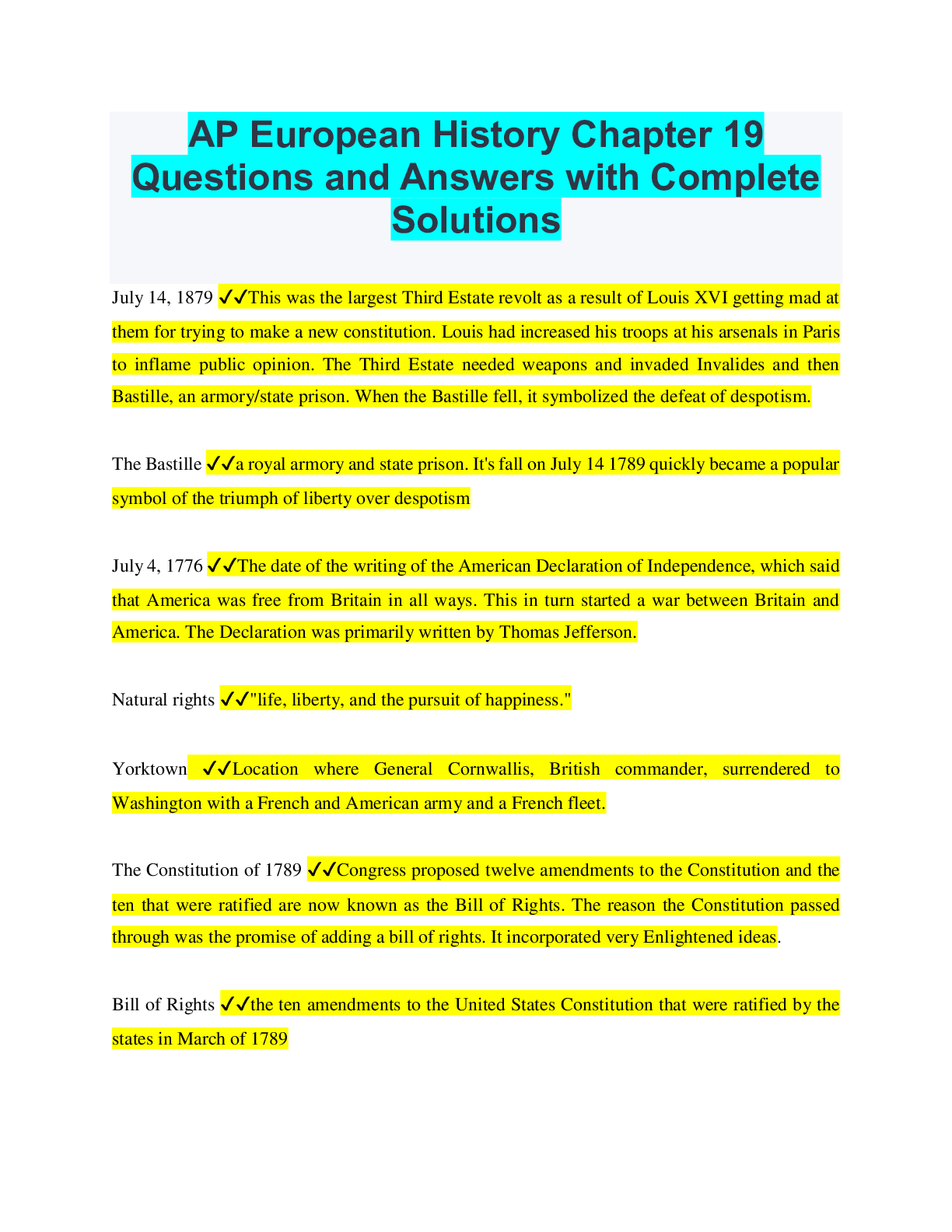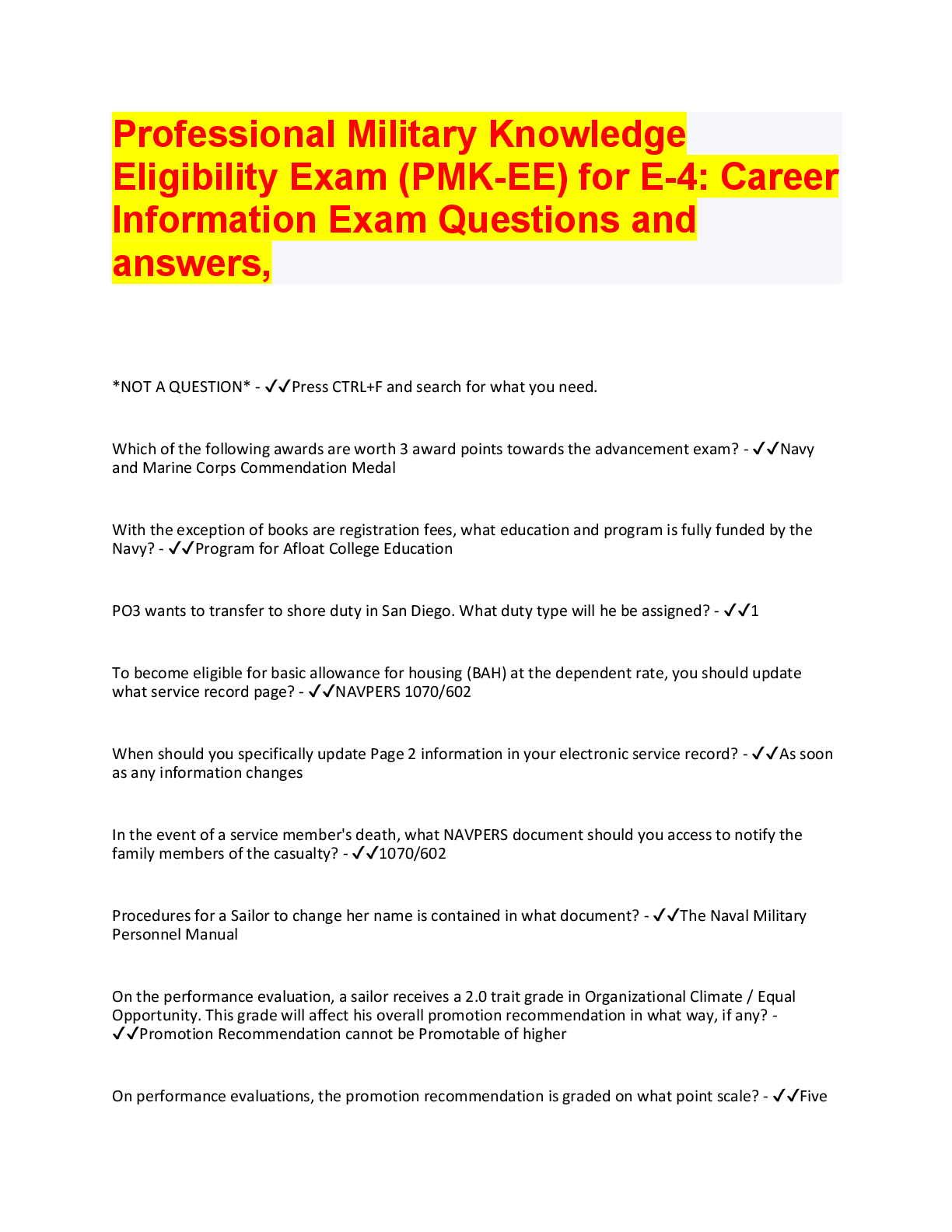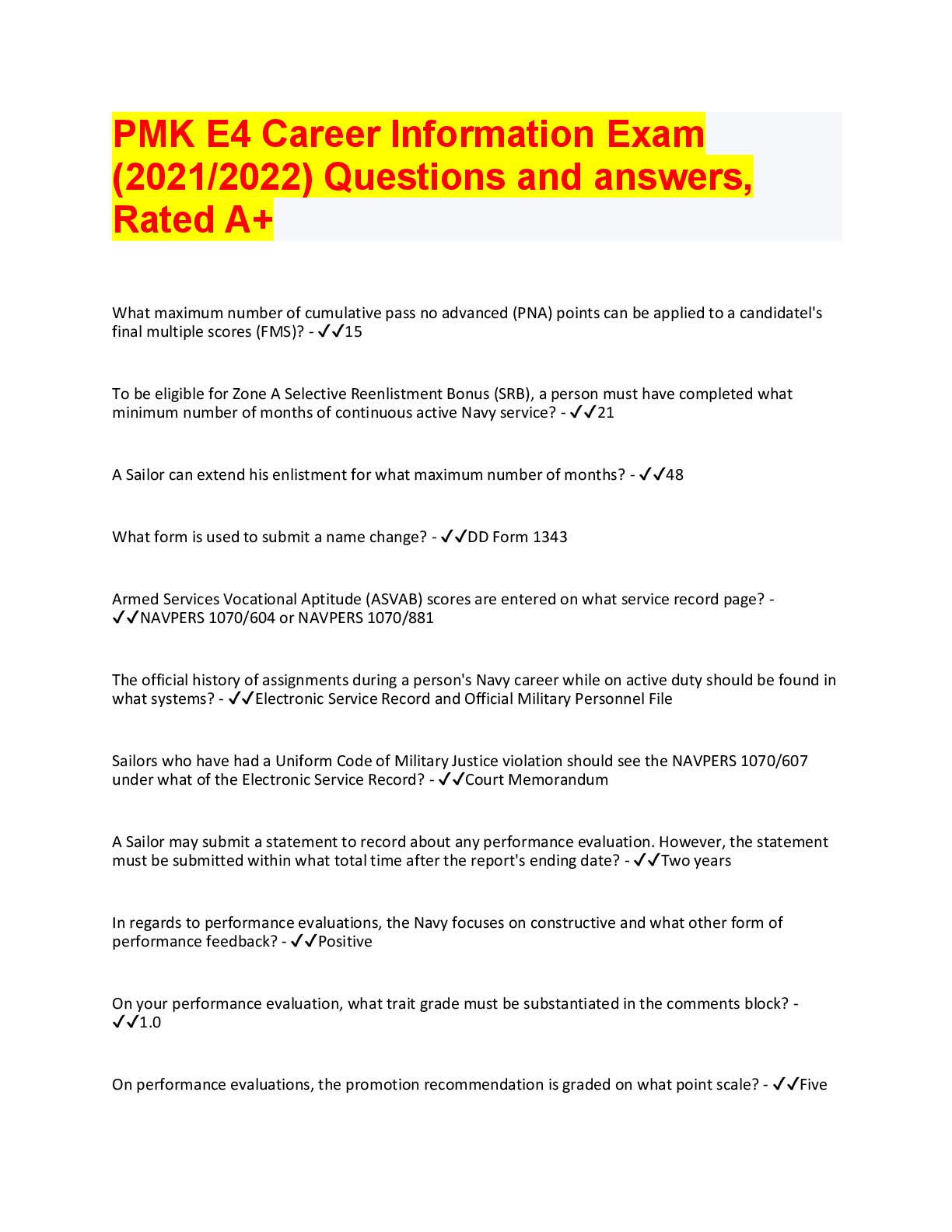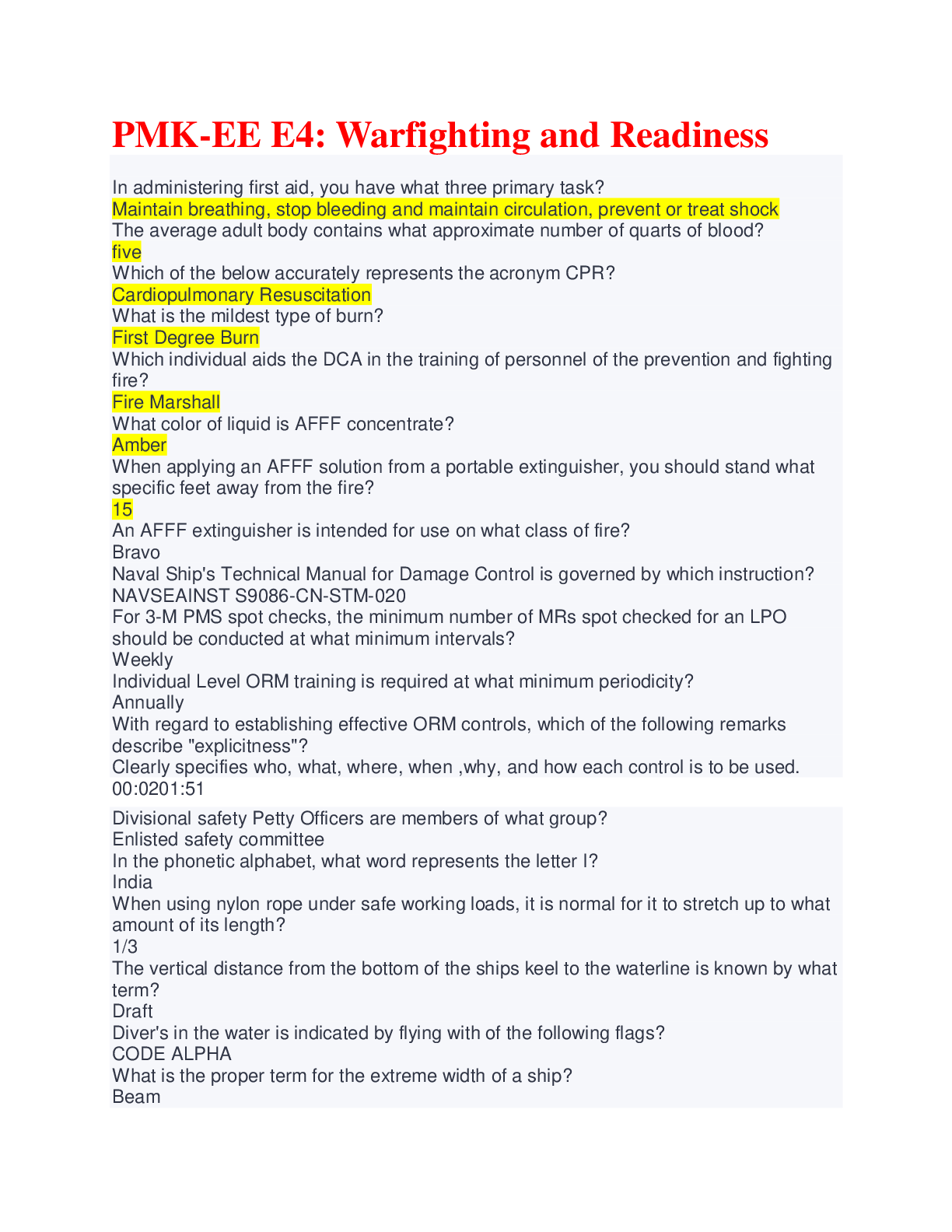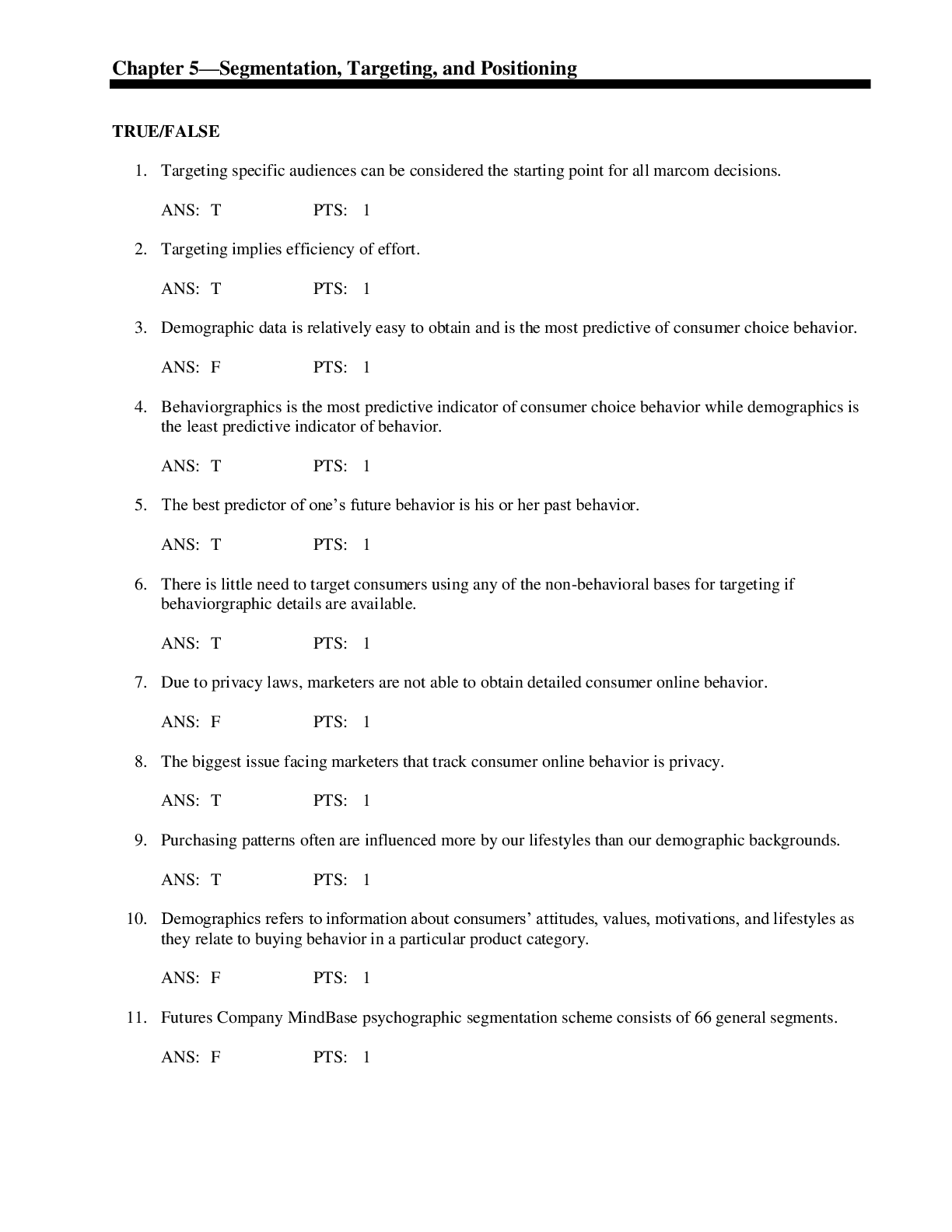History > QUESTIONS & ANSWERS > AP European History Exam Review Questions and Answers with Complete Solutions (All)
AP European History Exam Review Questions and Answers with Complete Solutions
Document Content and Description Below
AP European History Exam Review Questions and Answers with Complete Solutions Benvenuto Cellini ✔✔Goldsmith & sculptor who wrote an autobiography, famous for its arrogance and immodest self-pr... aise. Condottiere ✔✔Mercenary soldier of a political ruler. Humanism ✔✔Recovery and study of classical authors & writings. Individualism ✔✔Emphasis on the unique & creative personally (personality?). New Monarchs ✔✔Term applied to Louis XI of France, Henry VII of England, and Ferdinand & Isabella of Spain, who strengthened their monarchical authority often by Machiavellian means. Rationalism ✔✔Application and use of reason in understanding and explaining events. Renaissance ✔✔The period from 1400 to 1600 that witnessed a transformation of cultural and intellectual values from primarily Christian to classical or secular ones. Secularism ✔✔Emphasis on the here and now rather than on the spiritual and otherworldly. Lorenzo Valla ✔✔(1407-1457) Humanist who used historical criticism to discredit an eighthcentury document giving the papacy jurisdiction over Western lands. Virtu ✔✔Striving for personal excellence.Baroque ✔✔The sensuous and dynamic style of art of the Counter Reformation. Brethren of the Common Life ✔✔Pious laypeople in sixteenth-century Holland who initiated a religious revival in their model of Christian living. John Calvin ✔✔(1509-1564) French theologian who established a theocracy in Geneva and is best known for his theory of predestination. Charles V ✔✔(1519-1556) Hapsburg dynastic ruler of the Holy Roman Empire and of extensive territories in Spain and the Netherlands. Council of Trent ✔✔The congress of learned Roman Catholic authorities that met intermittently from 1545 to 1563 to reform abusive church practices and reconcile with the Protestants. Index ✔✔A list of books that Catholics were forbidden to read. Indulgence ✔✔Papal pardon for remission of sins. Inquisition ✔✔Religious committee of six Roman cardinals that tried heretics and punished the guilty by imprisonment and execution. Jesuits ✔✔(Society of Jesus) Founded by Ignatius Loyola (1491-1556) as a teaching and missionary order to resist the spread of Protestantism. John Knox ✔✔(1505-1572) Calvinist leader in sixteenth-century Scotland. Martin Luther ✔✔(1483-1546) German theologian who challenged the church's practice of selling indulgences, a challenge that ultimately led to the destruction of the Roman Catholic world.Sir Thomas More ✔✔(1478-1535) Renaissance humanist and chancellor of England. Executed by Henry VIII for his unwillingness to publicly recognize his king as Supreme Head of the church and clergy of England. Nepotism ✔✔Practice of rewarding relatives with church positions. Peace of Augsburg ✔✔(1555) Document in which Charles V recognized Lutheranism as a legal religion in the Holy Roman Empire. The faith of the prince determined the religion of his subjects. Pluralism ✔✔The holding of several benefices (church offices). Simony ✔✔Selling of church offices Theocracy ✔✔A community, such as Calvin's Geneva, in which the state is subordinate to the church. Usury ✔✔Practice of lending money for interest. Gustavus Adolphus ✔✔(1594-1632) Swedish Lutheran who won victories for the German Protestants in the Thirty Years War and lost his life in one of the battles. Duke of Alva ✔✔(1508-1582) Military leader sent by Phillip to pacify the Low Countries. Armada ✔✔(1588) Spanish vessels defeated in the English Channel by an English fleet, thus preventing Philip II's invasion of England. Vasco de Balboa ✔✔First European to reach the Pacific Ocean (1513).Catherine de Medici ✔✔(1547-1589) The wife of Henry II (1547-1559) of France, who exercised political influence after the death of her husband and during the rule of her weak sons. Christopher Columbus ✔✔First European to sail to the West Indies (1492). Concordat of Bologna ✔✔(1516) Treaty under which the French Crown recognized the supremacy of the pope over a council and obtained the right to appoint all French bishops and abbots. Fernando Cortez ✔✔Conqueror of the Aztecs (1519-1521). Defenestration of Prague ✔✔The hurling, by Protestants, of Catholic officials from a castle window in Prague, setting off the Thirty Years' War. Bartholomew Diaz ✔✔First European to reach the southern tip of Africa (1487-1488). Dutch East India Company ✔✔Government-chartered joint-stock company that controlled the spice trade in the East Indies. Edict of Nantes ✔✔(1598) The edict of Henry IV that granted Huguenots the rights of public worship and religious toleration in France. Elizabeth I ✔✔(1558-1603) Protestant ruler of England who helped stabilize religious tensions by subordinating theological issues to political considerations. Prince Henry the Navigator ✔✔Sponser of voyages along West African coasts (1418). Henry IV ✔✔(1589-1610) Formerly Henry of Navarre. Ascended the French throne as a convert to Catholicism. Surrived St. Bartholomew Day, signed Edict of Nantes, quoted as saying, "Paris is worth a mass."Huguenots ✔✔French Calvinists. Ferdinand Magellan ✔✔Circumnavigator of the globe (1519-1522). Peace of Westphalia ✔✔(1648) The treaty ending the Thirty Years' War in Germany. It allowed each prince - whether Lutheran, Catholic, or Calvinist - to choose the established creed of his territory. Philip II ✔✔(1556-1598) Son and successor to Charles V, ruling Spain and the Low Countries. Francisco Pizarro ✔✔Conqueror of Peru (1532-1533). St. Bartholemew's Day ✔✔(August 24, 1572). Catholic attack on Calvinists on the marriage day of Margaret of Valois to Henry of Navarre (later Henry IV). Prince William of Orange ✔✔(1572-1584) Leader of the seventeen provinces of the Netherlands. Cardinal Richelieu ✔✔(1585-1642) Minister to Louis XIII. His three point plan (1. Break the power of the nobility, 2. Humble the House of Austria, 3. Control the Protestants) helped to send France on the road to absolute monarchy. Absolutism ✔✔Theory that the monarch is supreme and can exercise full and complete power unilaterally. Bill of Rights ✔✔(1689) English document declaring that sovereignty resided with Parliament. Charles I ✔✔(1625-1649) Stuart king who brought conflict with Parliament to a head and was subsequently executed.Charles II ✔✔(1660-1685) Stuart king during the Restoration, following Cromwell's Interregnum. Colbert ✔✔(1619-1683) Financial minister under the French king Louis XIV who promoted mercantilist policies. Constitutionalism ✔✔Theory that power should be shared between rulers and their subjects and the state governed according to laws. Oliver Cromwell ✔✔(1559-1658) Principal leader and gentry member of the Puritans in Parliament. Diggers and Levellers ✔✔Radical groups in England in the 1650s who called for the abolition of private ownership and extension of the franchise. Divine right monarchy ✔✔Belief that a monarch's power derives from God and represents Him on earth. Frederick the Great ✔✔(1740-1786) The Prussian ruler who expanded his territory by invading the duchy of Silesia and defeating Maria Theresa of Austria. Frederick William ✔✔(1640-1688) The "Great Elector" who built a strong Prussian army and infused military values into Prussian society. French Classicism ✔✔Style in seventeenth-century art and literature resembling the arts in the ancient world and in the Renaissance - e.g. the works of Poussin, Moliere, and Racine. Fronde ✔✔The last aristocratic revolt against a French monarch.Glorious Revolution ✔✔Reference to the political events of 1688-1689 when James II abdicated his throne and was replaced by his daughter Mary and her husband, Prince William of Orange. Habeas corpus ✔✔Legal protection that prohibits the imprisonment of a subject without demonstrated cause. Thomas Hobbes ✔✔(1588-1679) Political theorist advocating absolute monarchy based on his concept of an anarchic state of nature. Interregnum ✔✔Period of Cromwellian rule (1649-1659), between the Stuart dynastic rules of Charles I and Charles II. James I ✔✔(1603-1625) Stuart monarch who ignored constitutional principles and asserted the divine right of kings. James II ✔✔(1685-1688) Final Stuart ruler. He was forced to abdicate in favor of William and Mary, who agreed to the Bill of Rights, guaranteeing parliamentary supremacy. John Locke ✔✔(1632-1704) Political theorist who defended the Glorious Revolution with the argument that all people are born with certain natural rights to life, liberty, and property. Louis XIV ✔✔(1643-1715) Also known as the "Sun King". The ruler of France who established the supremacy of absolutism in seventeenth-century Europe. Maria Theresa ✔✔(1740-1780) Archduchess of Austria, queen of Hungary. Lost the Hapsburg possession of Silesia to Frederick the Great but was able to keep her other Austrian territories. Mercantilism ✔✔Governmental policies by which the state regulates the economy, through taxes, tariffs, subsidies, laws.New Model Army ✔✔Disciplined fighting force of Protestants led by Oliver Cromwell in the English civil war. Peace of Utrecht ✔✔(1713) Pact concluding the War of the Spanish Succession, forbidding union of France with Spain, and conferring control of Gibraltar on England. Peter the Great ✔✔(1682-1725) Romanov czar who initiated the westernization of Russian society by traveling to the West and incorporating techniques of manufacturing as well as manners and dress. Petition of Right ✔✔(1628) Parliamentary document that restricted the king's power. Most notably, it called for recognition of the writ of habeas corpus and held that only Parliament could impose new taxes. Puritan Revolution ✔✔Reference to the English civil war (1642-1646), waged to determine whether sovereignty would reside in the monarch or in the Parliament. Puritans ✔✔Protestant sect in England hoping to "purify" the Anglican church of Roman Catholic traces in practice and organization. Restoration ✔✔Return of the Stuart monarchy (1660) after the period of republican government under Cromwell - in fact, a military dictatorship. Test Act ✔✔(1673) Law prohibiting Catholics and dissenters to hold political office. Versailles ✔✔Palace constructed by Louis XIV outside of Paris to glorify his rule and subdue the nobility. War of the Spanish Succession ✔✔(1701-1713) Last of Louis XIV's wars involving the issue of succession to the Spanish throne.William of Orange ✔✔(1672-1702) Dutch prince and foe of Louis XIV who became king of England in 1689. Aristotelian-Ptolemaic cosmology ✔✔The geocentric view of the universe that prevailed from the fourth century B.C. to the sixteenth and seventeenth centuries and accorded with church teachings and Scriptures. Francis Bacon ✔✔(1561-1626) Inductive thinker who stressed experimentation in arriving at the truth. Nicholaus Copernicus ✔✔(1473-1543) Polish astronomer who posited a heliocentric universe in place of a geocentric universe. Deism ✔✔The belief that God has created the universe and set it in motion to operate like clockwork. God is literally in the wings watching the show go on as humans forge their own destiny. Rene Descarte ✔✔(1596-1650) Deductive thinker whose famous saying "cogito, ergo sum" ("I think, therefore I am") challenged the notion of truth as being derived from tradition and Scriptures. Enlightenment ✔✔The intellectual revolution of the eighteenth century in which the philosophes stressed reason, natural law, and progress in their criticism of prevailing social injustices. Galileo ✔✔(1564-1642) Italian scientist who formulated terrestrial laws and the modern law of Inertia. He also provided evidence for the Copernican hypothesis. Laissez-faire ✔✔Economic concept of the Scottish philosophe Adam Smith (1723-1790). In opposition to mercantilism, Smith urged governments to keep hands off the operation of the economy. He believed the role of government was analogous to the night watchman, guarding andprotecting, but not intervening in the operation of the economy, which must be left to run in accord with the natural laws of supply and demand. Isaac Newton ✔✔(1642-1727) English scientist who formulated the law of gravitation that posited a universe operating in accord with natural law. Philosophes ✔✔Social critics of the eighteenth century who subjected social institutions and practices to the test of reason. Royal Society of London and French Academy of Sciences ✔✔Organized bodies for scientific study. Tabula rasa ✔✔John Locke's concept of the mind as a blank sheet ultimately bombarded by sense impressions that, aided by human reasoning, formulate ideas. Crime and Punishment ✔✔Cesare Beccaria Sketch of the Progress of the Human Mind ✔✔Condorcet Encyclopedia ✔✔Denis Diderot An Inquiry Concerning Human Understanding ✔✔David Hume Two Treatises on Goverment; Essay on Human Understanding ✔✔John Lo [Show More]
Last updated: 2 years ago
Preview 1 out of 38 pages
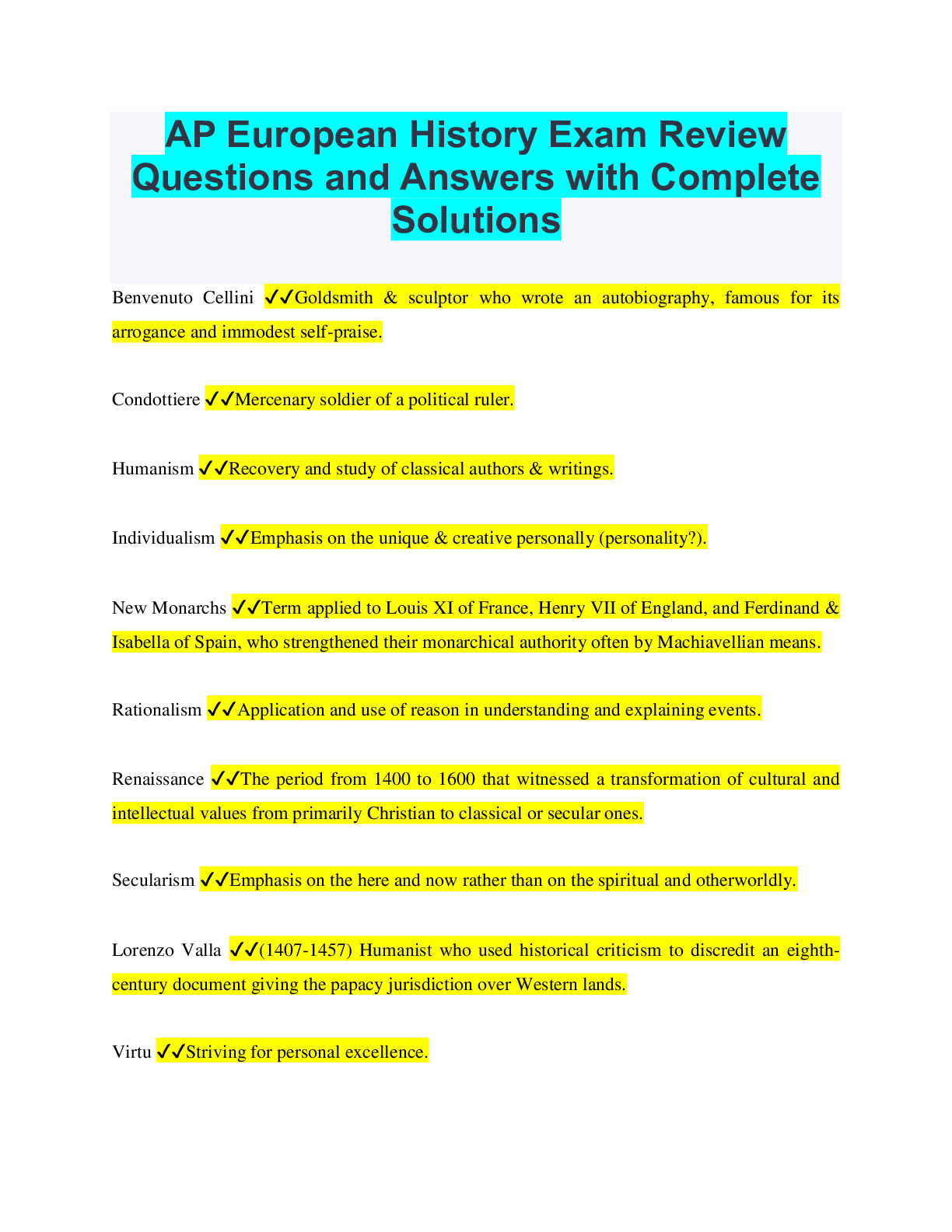
Buy this document to get the full access instantly
Instant Download Access after purchase
Buy NowInstant download
We Accept:

Reviews( 0 )
$8.00
Can't find what you want? Try our AI powered Search
Document information
Connected school, study & course
About the document
Uploaded On
Sep 27, 2022
Number of pages
38
Written in
Seller

Reviews Received
Additional information
This document has been written for:
Uploaded
Sep 27, 2022
Downloads
0
Views
144
